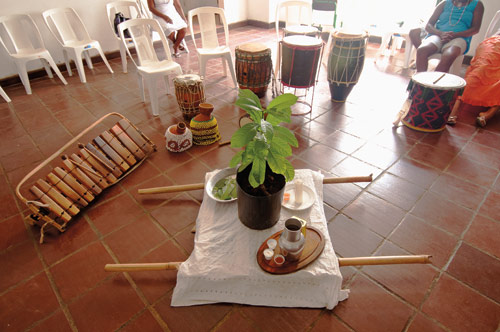2014 Sandi Hilal, Alessandro Petti and Grupo Contrafilé
Sandi Hilal and Alessandro Petti have been recently working on Campus in Camps, an educational platform that enables communities of Palestinian refugees to produce new forms of representation of the camps and of themselves, overcoming the static symbols of victimisation, passivity and poverty.
Meanwhile, the Contrafilé group has developed the project A rebelião das crianças [The Children’s Uprising], which saw the creation of Quintais [Backyards] as its most recent stage. In this project, the collective processes established through playing enable a territory of freedom that activates in our bodies a potency-landscape, allowing us to create the space in which we live our lives.
Sandi Hilal and Alessandro Petti and Contrafilé were challenged by the 31st Bienal’s curatorial team to come up with a joint project. They soon noticed the similarities between their research – most notably, both groups have been working on the ambivalence of how one relates to the land, as an incontestable proof of commonality as well as a territory fertile with contradictions.
 Contrafilé introduced TC Silva (the founder of Mocambos network and active in the integration of the political struggles of indigenous people, landless workers and communities of quilombolas) to Petti and Hilal, who brought with them the experience of mujawara (the Arabic word for ‘neighbourhood’), an environment of libertarian, decolonising education.
Contrafilé introduced TC Silva (the founder of Mocambos network and active in the integration of the political struggles of indigenous people, landless workers and communities of quilombolas) to Petti and Hilal, who brought with them the experience of mujawara (the Arabic word for ‘neighbourhood’), an environment of libertarian, decolonising education.
As a central situation that encompasses all others, a mujawara was set up in the south of Bahia between Palestinian refugees, quilombolas, researchers, artists, indigenous people and members of the Landless Workers’ Movement (MST). Acting in a network, they organised talks and situations that fostered the debate on displacement, exile and the construction of identities – concepts that are inherent to today’s definition of ‘collectivity’. As a result of this work, a book has been published telling the story of the process, and an installation has been built inside the pavilion’s Park area. – WS